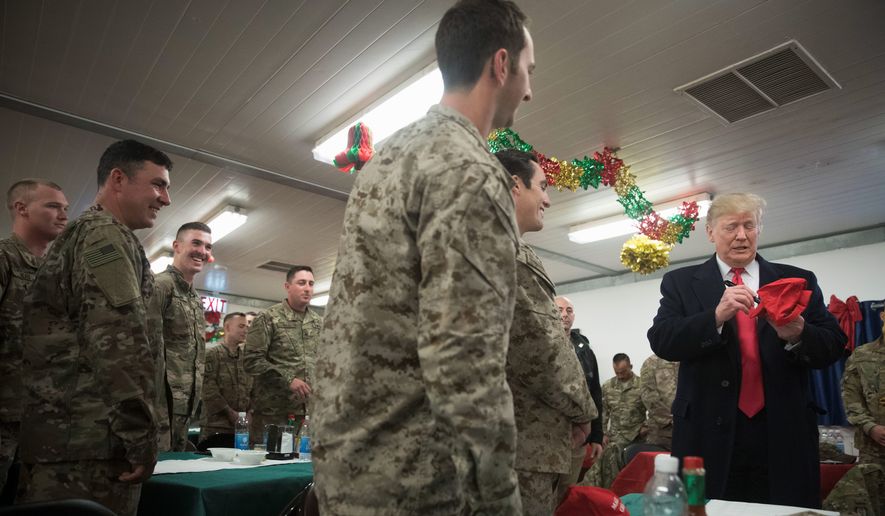President Trump returned Thursday to the White House after a surprise visit with U.S. troops in Iraq, lauding America’s service members for possessing a trait that he holds in the highest regard — knowing how to win.
He fired off a tweet praising the troops upon arriving back at the White House shortly before sunrise.
“Just returned from visiting our troops in Iraq and Germany. One thing is certain, we have incredible people representing our Country — people that know how to win!” he tweeted.
Mr. Trump, however, could not engage in the time-honored tradition of rallying troops in a war zone without coming under a hail of criticism at home and from politicians in Iraq.
On CNN, a retired military officer scolded Mr. Trump for signing an iconic red MAGA cap handed to him by a service member during the visit to Al Asad Air Base west of Baghdad.
“That is a campaign item, and it’s completely inappropriate for the troops to do this,” said retired Rear Adm. John Kirby, a State Department and Pentagon spokesman during the Obama administration.
Others faulted Mr. Trump for not visiting a war zone sooner and for what they described as treating the visit like a campaign rally.
White House press secretary Sarah Huckabee Sanders fired back on Twitter.
“CNN will attack anyone who supports President Trump, including the brave men and women of our military who fight everyday to protect our freedom,” she tweeted.
Accompanied by first lady Melania Trump, the president left Washington late Tuesday, arrived in Iraq on Wednesday, briefly visited troops at an air base in Germany on the return trip and arrived back at the White House early Thursday.
Mr. Trump was the third U.S. president to visit troops in Iraq, though he was treated much more harshly by the news media than his predecessors for the effort.
President George W. Bush’s visit on Thanksgiving in 2003 was highly celebrated for the secrecy in which he was jetted to the war zone and for his bolstering of the troops.
The New York Times noted that presidential historian Douglas Brinkley, appearing on CNN, called Mr. Bush’s visit “a perfectly executed plan” that would be “one of the major moments in his biography.”
President Barack Obama’s visit in April 2009 was heralded as turning point in U.S. foreign policy, as he promised to wind down Mr. Bush’s wars in the Middle East.
“You have given Iraq the opportunity to stand on its own as a democratic country. That is an extraordinary achievement,” Mr. Obama told the troops. “It is time for us to transition to the Iraqis. They need to take responsibility for their country.”
By contrast, Mr. Trump was hit with an onslaught of criticism for making the trip on the heels of his order to withdraw all 2,000 U.S. troops in neighboring Syria.
In an address to the service members in Iraq, Mr. Trump credited them with helping nearly eliminating the Islamic State, thus making the withdrawal possible.
“Two years ago, when I became president, they were a very dominant group. They were very dominant. Today they are not so dominant anymore,” he said to cheers from the troops.
Mr. Trump said he had no plans to pull out the forces in Iraq, where U.S. forces are poised to respond to any Islamic State resurgence.
Meanwhile, Iraqi lawmakers demanded U.S. troops leave the country because of Mr. Trump’s unannounced visit, which they called an arrogant violation of national sovereignty.
“Trump needs to know his limits. The American occupation of Iraq is over,” said Sabah al-Saidi, the head of one of two main blocs in Iraq’s parliament.
He said the president slipped into the country “as though Iraq is a state of the United States.”
U.S. troops are stationed in Iraq as part of the coalition fighting the Islamic State terrorist group. U.S. forces withdrew in 2011 after invading in 2003 but returned in 2014 at the invitation of the Iraqi government to help fight the jihadi group. They remain in Iraq only by invitation.
During Mr. Trump’s three-hour visit to Iraq, which did not include a stop in the capital Baghdad, he did not meet with any Iraqi officials. He did speak by phone with Prime Minister Adel Abdul-Mahdi.
Mr. Abdul-Mahdi accepted Mr. Trump’s invitation to the White House during their call, Mrs. Sanders said.
• S.A. Miller can be reached at smiller@washingtontimes.com.




Please read our comment policy before commenting.